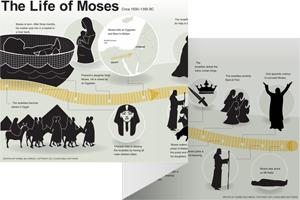15:1–9 Yahweh responds to the people’s lament and confession in 14:19–22, emphasizing again that the time for prophetic intercession has passed. Nothing can avert the coming destruction. |
15:1 Moses and Samuel Examples of prophetic intercessors. See Num 21:7; 1 Sam 12:19.
15:2 Those who are destined for the plague, to the plague Pestilence, famine, and sword form an image of divine judgment. Sometimes exile (Jer 15:2b) and wild beasts (v. 3) were added to the list of punishments. See note on 14:12; compare Ezek 6:11–12.
15:4 Manasseh Judah’s most wicked king (see note on 2 Chr 33:1).
Manasseh |
15:7 a winnowing fork A six-pronged fork for tossing harvested grain into the air so the wind could blow away the lightweight chaff, while the heavier grain kernels fell to the ground. Winnowing can metaphorically represent the way God deals with people and nations, separating the worthless chaff from the grain worth saving. Compare Isa 41:15–16.
15:9 She who gave birth to seven A sign of divine blessing, since seven symbolizes completeness. Compare 1 Sam 2:5; Ruth 4:15.
15:10–21 Jeremiah’s third complaint reflects his despair over the double disaster he will experience—the persecution from his own people and the horrors of enemy attack and exile. The complaint consists of Jeremiah’s lament (Jer 15:10–18) and Yahweh’s reply (vv. 19–21). |
15:10 Woe to me Compare 20:14 and Job 3:3. Jeremiah complains that he is publicly rejected and cursed.
15:11 to be good This Hebrew phrase is difficult, leading to a variety of suggested translations. The basic sense seems to be that Yahweh is reassuring Jeremiah that He has a good purpose behind everything, even persecution and suffering.
15:12 iron Alludes to the divine strengthening that Yahweh gave Jeremiah in Jer 1:17–19.
15:13 your wealth and your treasures Judah’s wealth will be taken as plunder by the invaders.
15:15 take revenge for me against my persecutors Jeremiah calls on Yahweh to punish his persecutors. The language is similar to individual lament psalms that contain imprecatory language, requesting judgment and disaster on one’s enemies. Compare Psa 35.
15:16 I ate them A poetic reference to Yahweh putting His words in Jeremiah’s mouth for him to speak. Compare Jer 1:9; Ezek 2:8–3:3.
jubilation, even as the joy of my heart The prophet’s experience of the divine word is pleasant and positive.
15:17 your hand A prophet’s experience of Yahweh’s power is often described as the hand of God (compare Isa 8:11; Ezek 3:14). See Ezek 1:3 and note.
15:19 If you turn back Yahweh’s response to Jeremiah implies that he has wandered away from his prophetic responsibilities, perhaps siding too much with the people under judgment. Yahweh is calling him to repent or return—both possible meanings of the Hebrew word—so he can be reinstated as Yahweh’s spokesman.
 The Significance of “Shuv” in Jeremiah
The Significance of “Shuv” in Jeremiah
15:20 a wall of fortified bronze Yahweh reiterates His promise to strengthen and protect Jeremiah, echoing the language of his initial call and commission in Jer 1:4–10, 17–19.
15:21 I will deliver you The renewed promise of deliverance implies that Jeremiah will continue to be persecuted for representing Yahweh.

|
About Faithlife Study BibleFaithlife Study Bible (FSB) is your guide to the ancient world of the Old and New Testaments, with study notes and articles that draw from a wide range of academic research. FSB helps you learn how to think about interpretation methods and issues so that you can gain a deeper understanding of the text. |
| Copyright |
Copyright 2012 Logos Bible Software. |
| Support Info | fsb |
 Loading…
Loading…


 Manasseh
Manasseh  was the son of the righteous King Hezekiah and grandfather of King Josiah. He ruled Judah 697–642
was the son of the righteous King Hezekiah and grandfather of King Josiah. He ruled Judah 697–642